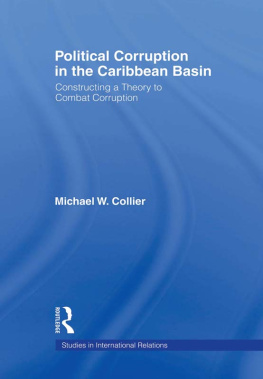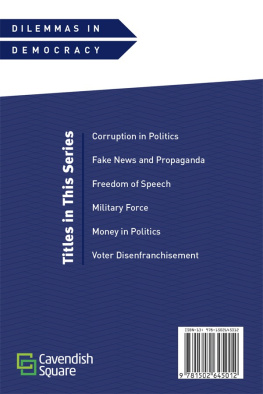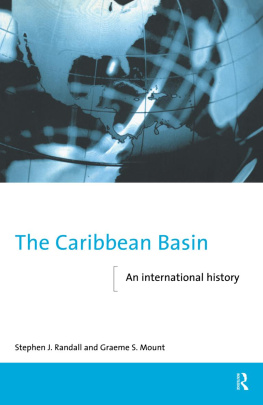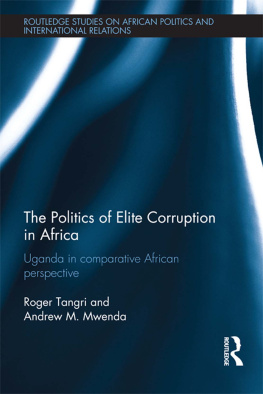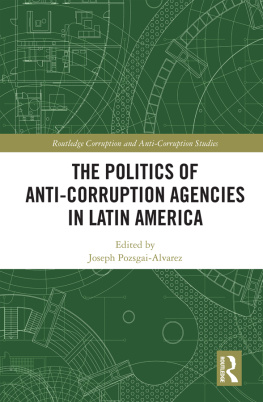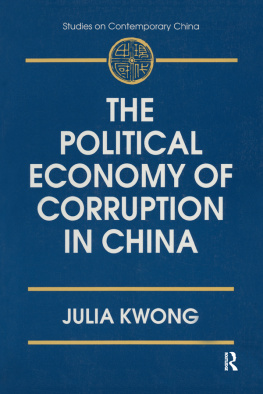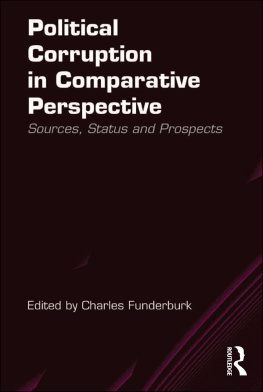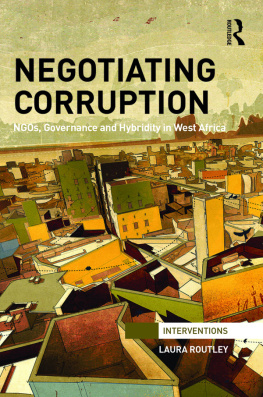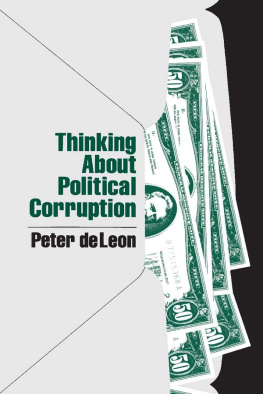STUDIES IN INTERNATIONAL RELATIONS
Edited by
Charles MacDonald
Florida International University
A ROUTLEDGE SERIES
STUDIES IN INTERNATIONAL RELATIONS
CHARLES MACDONALD, General Editor
PROMOTING WOMEN'S RIGHTS
The Politics of Gender in the European Union
Chrystalla A. Ellina
TURKISH FOREIGN POLICY AND TURKISH IDENTITY
A Constructivist Approach
Ycel Bozdaliolu
ORGANIZING THE WORLD
The United States and Regional Cooperation in Asia and Europe
Galia Press-Barnathan
HUMAN RIGHTS IN CUBA, EL SALVADOR AND NICARAGUA
A Sociological Perspective on Human Rights Abuse
Mayra Gmez
NEGOTIATING THE ARCTIC
The Construction of an International Region
E.C.H. Keskitalo
THE COMMON FISHERIES POLICY IN THE EUROPEAN UNION
A Study in Integrative and Distributive Bargaining
Eugnia da Conceio-Heldt
INTERNATIONAL ENVIRONMENTAL TREATIES AND STATE BEHAVIOR
Factors Influencing Cooperation
Denise K. DeGarmo
POLITICAL CORRUPTION IN THE CARIBBEAN BASIN
CONSTRUCTING A THEORY TO COMBAT CORRUPTION
Michael W. Collier
Routledge
New York & London
| First published 2005 by | Published in Great Britain by |
| Routledge | Routledge |
| 270 Madison Avenue | 2 Park Square |
| New York, NY 10016 | Milton Park, Abingdon |
| www.routledge-ny.com | Oxon, OX14 4RN |
| www.routledge.co.uk |
Routledge is an imprint of the Taylor & Francis Group.
Transferred to Digital Printing 2009
Copyright 2005 Taylor & Francis Group, a Division of T&F Informa
All rights reserved. No part of this book may be printed or utilized in any form or by any electronic, mechanical or other means, now know or hereafter invented, including photocopying and recording, or any other information storage or retrieval system, without permission in writing from the publisher.
Trademark Notice: Product or corporate names may be trademarks or registered trademarks, and are used only for identification and explanation without intent to infringe.
Portions of previously appeared in:
Michael W. Collier, Failed Policy: Analyzing Inter-American Anticorruption Programs in Foreign Policy in a Constructed word, ed. Vendulka Kubalkova (Armok, NY: ME Sharpe, 2001), pp. 173-202. Copyright 2001 by M.E. Sharpe, Inc. Used by permission
Michael W. Collier, Explaining Corruption: An Institutional Choice Approach. Crime, Law, & Social Change Vol. 38, Issue 1 (2002), 132. (Kluwer Academic Publishers, used with kind permission of Spring Science and Business Media).
Library of Congress Cataloging-In-Publication Data
Collier, Michael W.
Political Corruption in the Caribbean Basin: Constructing a Theory to
Combat Corruption
p. cm. (East asia)
Includes bibliographical references and index.
ISBN: 0-415-97328-7 (hardback)
1. Television broadcastingChina. 2. Television broadcastingJapan.
3. Television broadcasting policyChina. 4. Television broadcasting
policyJapan. 5. Nihon Hoso Kyokai. 6. Zhong yang dian shi tai
(Beijing, China) I. Title. II. Series: East Asia (New York, NY.)
| PN1992.3.C6W48 2005 |
| 384.55095090511dc22 | 2004025355 |
ISBN: 0-415-97328-7 (hbk)
ISBN: 0-415-80492-2 (pbk)
ISBN: 978-0-415-97328-1 (hbk)
ISBN: 978-0-415-80492-9 (pbk)
To my wife Gloria.
Table of Contents
My first encounter with corruption in the Caribbean Basin occurred just after I began my United States Coast Guard career. On graduating from the U.S. Coast Guard Academy in 1974, I was assigned to the U.S. Coast Guard Cutter Dauntless (WMEC 624) at Miami Beach, Florida. Soon after I reported aboard Dauntless, we were dispatched to the Bahamian capital city of Nassau to retrieve several hundred pounds of seized marijuana that was needed for a court case in Miami. When we moored in Nassau the next day, we found that half the seized marijuana had been stolen the night before from the Bahamian Police jail cell where it was being stored. This was just the first of many personal encounters with Caribbean Basin official misconduct and corruption problems.
Caribbean Basin corruption was an ever-present factor during my career in the U.S. Coast Guard. I spent over 20 years involved in the Drug War, either aboard cutters conducting counter-drug patrols in the Caribbean or in staff jobs providing intelligence support to U.S. and allied counter-drug forces. It was standard practice to consider the corruption factor whenever planning maritime drug interdiction operations with Caribbean governments and before sharing sensitive information with Caribbean officials. It took considerable time to confirm who we could and could not trust in most Caribbean statesand sometimes we never figured it out.
The problem with corruption was especially evident during my assignment as the U.S. Coast Guard Attache in the U.S. Embassy in Bogota, Colombia, from 1990 to 1992. Corruption was everywhere in Colombia. Some of the corruption was understandable because of the meager salaries the Colombian government paid lower ranking military and civilian officials. Even simple interactions with the Colombian bureaucracy, like buying local car insurance, required a small bribe. It was common for Colombian National Police traffic officers to stop automobiles in hopes of extorting bribes in exchange for not issuing trumped-up traffic citations. We also experienced a seemingly endless flow of information into the U.S. Embassy about drug-related corruption in the Colombian military, police, and government agencies. A Colombian naval officer friend offered an explanation for this corruption:
The system makes us corrupt. Selection as a Colombian military or police officer is a ticket to a middle class lifestyle. The salary is not that great, but the social standing that comes with being an officer, plus benefits such as subsidized housing, commissaries, and officer clubs makes for a good life. Unfortunately, the military retirement system does not allow you to continue in this middle class existence after you leave the service. Therefore, to live well after retirement most military and police officers have three options: (1) marry money, (2) work yourself into several foreign assignments and save the inflated per diem [viaticos] that officers living outside Colombia are paid, or (3) be corrupt.
I found my Colombian Navy friend's explanation of his country's military and police corruption quite insightful. It applied equally to Colombian government civil servants who also seemed to be forced into corrupt behavior to prepare for retirement. These insights helped me understand the corrupt behavior of Colombian military, police, and government officials. It also made me wonder what structural factors contributed to the corruption of senior Colombian government officialspeople who were mostly from the wealthy upper and upper-middle classes and did not need the resources gained from corruption to ensure a comfortable retirement.
During my Colombia assignment, I also noticed the wide disparity in how U.S. government officials approached the corruption problem. I met numerous members of the U.S. law enforcement community who saw the

